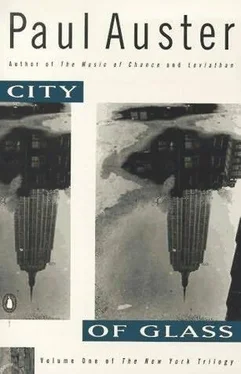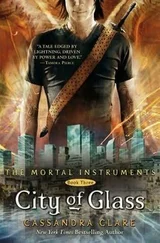Paul Auster - City of Glass
Здесь есть возможность читать онлайн «Paul Auster - City of Glass» весь текст электронной книги совершенно бесплатно (целиком полную версию без сокращений). В некоторых случаях можно слушать аудио, скачать через торрент в формате fb2 и присутствует краткое содержание. Жанр: Современная проза, на английском языке. Описание произведения, (предисловие) а так же отзывы посетителей доступны на портале библиотеки ЛибКат.
- Название:City of Glass
- Автор:
- Жанр:
- Год:неизвестен
- ISBN:нет данных
- Рейтинг книги:5 / 5. Голосов: 1
-
Избранное:Добавить в избранное
- Отзывы:
-
Ваша оценка:
- 100
- 1
- 2
- 3
- 4
- 5
City of Glass: краткое содержание, описание и аннотация
Предлагаем к чтению аннотацию, описание, краткое содержание или предисловие (зависит от того, что написал сам автор книги «City of Glass»). Если вы не нашли необходимую информацию о книге — напишите в комментариях, мы постараемся отыскать её.
City of Glass — читать онлайн бесплатно полную книгу (весь текст) целиком
Ниже представлен текст книги, разбитый по страницам. Система сохранения места последней прочитанной страницы, позволяет с удобством читать онлайн бесплатно книгу «City of Glass», без необходимости каждый раз заново искать на чём Вы остановились. Поставьте закладку, и сможете в любой момент перейти на страницу, на которой закончили чтение.
Интервал:
Закладка:
What all this had to do with the New World Quinn could not say. But then a new chapter started, and suddenly Stillman was discussing the life of Henry Dark, a Boston clergyman who was bom in London in 1649 (on the day of Charles I's execution), came to America in 1675, and died in a fire in Cambridge, Massachusetts, in 1691.
According to Stillman, as a young man Henry Dark had served as private secretary to John Milton-from 1669 until the poet's death five years later. This was news to Quinn, for he seemed to remember reading somewhere that the blind Milton had, dictated his work to one of his daughters. Dark, he learned, was an ardent Puritan, a student of theology, and a devoted follower of Milton 's work. Having met his hero one evening at a small gathering, he was invited to pay a call the following week. That led to further calls, until eventually Milton began to entrust Dark with various small tasks: taking dictation, guiding him through the streets of London, reading to him from the works of the ancients. In a 1672 letter written by Dark to his sister in Boston, he mentioned long discussions with Milton on the finer points of Biblical exegesis. Then Milton died, and Dark was disconsolate. Six months later, finding England a desert, a land that offered him nothing, he decided to emigrate to America. He arrived in Boston in the summer of 1675.
Little was known of his first years in the New World. Stillman speculated that he might have travelled westward, foraging out into unchartered territory, but no concrete evidence could be found to support this view. On the other hand, certain references in Dark's writings indicated an intimate knowledge of Indian customs, which led Stillman to theorize that Dark might possibly have lived among one of the tribes for a period of time. Be that as it may, there was no public mention of Dark until 1682, when his name was entered in the Boston marriage registry as having taken one Lucy Fitts as his bride. Two years later, he was listed as heading a small Puritan congregation on the outskirts of the city. Several children were born to the couple, but all of them died in infancy. A son John, however, born in 1686, survived. But in 1691 the boy was reported to have fallen accidentally from a second-story window and perished. Just one month later, the entire house went up in flames, and both Dark and his wife were killed.
Henry Dark would have passed into the obscurity of early American life if not for one thing: the publication of a pamphlet in 1690 entitled The New Babel. According to Stillman, this little work of sixty-four pages was the most visionary account of the new continent that had been written up to that time. If Dark had not died so soon after its appearance, its effect would no doubt have been greater. For, as it turned out, most of the copies of the pamphlet were destroyed in the fire that killed Dark. Stillman himself had been able to discover only one-and that by accident, in the attic of his family's house in Cambridge. After years of diligent research, he had concluded that this was the only copy still in existence.
The New Babel, written in bold, Miltonic prose, presented the case for the building of paradise in America. Unlike the other writers on the subject, Dark did not assume paradise to be a place that could be discovered. There were no maps that could lead a man to it, no instruments of navigation that could guide a man to its shores. Rather, its existence was immanent within man himself: the idea of a beyond he might someday create in the here and now. For utopia was nowhere- even, as Dark explained, in its "wordhood." And if man could bring forth this dreamed-of place, it would only be by building it with his own two hands.
Dark based his conclusions on a reading of the Babel story as a prophetic work. Drawing heavily on Milton 's interpretation of the fall, he followed his master in placing an inordinate importance on the role of language. But he took the poet's ideas one step further. If the fall of man also entailed a fall of language, was it not logical to assume that it would be possible to undo the fall, to reverse its effects by undoing the fall of language, by striving to recreate the language that was spoken in Eden? If man could learn to speak this original language of innocence, did it not follow that he would thereby recover a state of innocence within himself? We had only to look at the example of Christ, Dark argued, to understand that this was so. For was Christ not a man, a creature of flesh and blood? And did not Christ speak this prelapsarian language? In Milton's Paradise Regained, Satan speaks with "double-sense deluding," whereas Christ's "actions to his words accord, his words / To his large heart give utterance due, his heart / Contains of good, wise, just, the perfect shape." And had God not "now sent his living Oracle / Into the World to teach his final will, / And sends his Spirit of Truth henceforth to dwell / In pious Hearts, an inward Oracle / To all Truth requisite for me to know"? And, because of Christ, did the fall not have a happy outcome, was it not a felix culpa , as doctrine instructs? Therefore, Dark contended, it would indeed be possible for man to speak the original language of innocence and to recover, whole and unbroken, the truth within himself.
Turning to the Babel story, Dark then elaborated his plan and announced his vision of things to come. Quoting from the second verse of Genesis 11-"And it came to pass, as they journeyed from the east, that they found a plain in the land of Shinar; and they dwelt there"-Dark stated that this passage proved the westward movement of human life and civilization. For the city of Babel -or Babylon -was situated in Mesopotamia, far east of the land of the Hebrews. If Babel lay to the west of anything, it was Eden, the original site of mankind. Man's duty to scatter himself across the whole earth-in response to God's command to "be fertile… and fill the earth"-would inevitably move along a western course. And what more western land in all Christendom, Dark asked, than America? The movement of English settlers to the New World, therefore, could be read as the fulfillment of the ancient commandment. America was the last step in the process. Once the continent had been filled, the moment would be ripe for a change in the fortunes of mankind. The impediment to the building of Babel -that man must fill the earth-would he eliminated. At that moment it would again be possible for the whole earth to be of one language and one speech. And if that were to happen, paradise could not be far behind.
Just as Babel had been built 340 years after the Flood, so it would be, Dark predicted, exactly 340 years after the arrival of the Mayflower at Plymouth that the commandment would be carried out. For surely it was the Puritans, God's newly chosen people, who held the destiny of mankind in their hands. Unlike the Hebrews, who had failed God by refusing to accept his son, these transplanted Englishmen would write the final chapter of history before heaven and earth were joined at last. Like Noah in his ark, they had traveled across the vast oceanic flood to carry out their holy mission.
Three hundred and forty years, according to Dark's calculations, meant that in 1960 the first part of the settlers' work would have been done. At that point, the foundations would have been laid for the real work that was to follow: the building of the new Babel. Already, Dark wrote, he saw encouraging signs in the city of Boston, for there, as nowhere else in the world, the chief construction material was brick-which, as set forth in verse three of Genesis 11, was specified as the construction material of Babel. In the year 1960, he stated confidently, the new Babel would begin to go up, its very shape aspiring toward the heavens, a symbol of the resurrection of the human spirit. History would be written in reverse. What had fallen would be raised up; what had been broken would be made whole. Once completed, the Tower would be large enough to hold every inhabitant of the New World. There would be a room for each person, and once he entered that room, he would forget everything he knew. After forty days and forty nights, he would emerge a new man, speaking God's language, prepared to inhabit the second, everlasting paradise.
Читать дальшеИнтервал:
Закладка:
Похожие книги на «City of Glass»
Представляем Вашему вниманию похожие книги на «City of Glass» списком для выбора. Мы отобрали схожую по названию и смыслу литературу в надежде предоставить читателям больше вариантов отыскать новые, интересные, ещё непрочитанные произведения.
Обсуждение, отзывы о книге «City of Glass» и просто собственные мнения читателей. Оставьте ваши комментарии, напишите, что Вы думаете о произведении, его смысле или главных героях. Укажите что конкретно понравилось, а что нет, и почему Вы так считаете.












